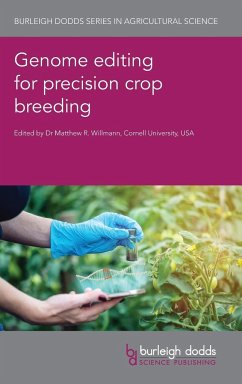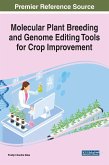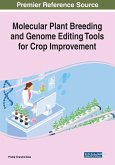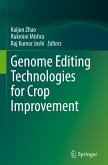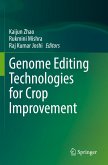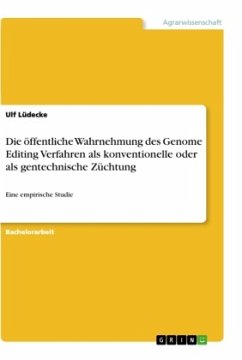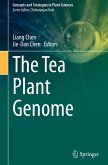Genome editing for precision crop breeding
Herausgeber: Willmann, Matthew R.
Genome editing for precision crop breeding
Herausgeber: Willmann, Matthew R.
- Gebundenes Buch
- Merkliste
- Auf die Merkliste
- Bewerten Bewerten
- Teilen
- Produkt teilen
- Produkterinnerung
- Produkterinnerung
Part 1 of this volume reviews advances in gene editing techniques such as insertion-based genome edits, base editing, guide RNAs and CRISPR/Cas off targeting. Part 2 surveys applications of gene editing in key cereal and vegetable crops.
Andere Kunden interessierten sich auch für
![Molecular Plant Breeding and Genome Editing Tools for Crop Improvement Molecular Plant Breeding and Genome Editing Tools for Crop Improvement]() Pradip Chandra DekaMolecular Plant Breeding and Genome Editing Tools for Crop Improvement229,99 €
Pradip Chandra DekaMolecular Plant Breeding and Genome Editing Tools for Crop Improvement229,99 €![Molecular Plant Breeding and Genome Editing Tools for Crop Improvement Molecular Plant Breeding and Genome Editing Tools for Crop Improvement]() Pradip Chandra DekaMolecular Plant Breeding and Genome Editing Tools for Crop Improvement177,99 €
Pradip Chandra DekaMolecular Plant Breeding and Genome Editing Tools for Crop Improvement177,99 €![Genome Editing Technologies for Crop Improvement Genome Editing Technologies for Crop Improvement]() Genome Editing Technologies for Crop Improvement132,99 €
Genome Editing Technologies for Crop Improvement132,99 €![Genome Editing Technologies for Crop Improvement Genome Editing Technologies for Crop Improvement]() Genome Editing Technologies for Crop Improvement95,99 €
Genome Editing Technologies for Crop Improvement95,99 €![Basics of Crispr/Cas Mediated Plant Genome Editing Basics of Crispr/Cas Mediated Plant Genome Editing]() Basics of Crispr/Cas Mediated Plant Genome Editing183,99 €
Basics of Crispr/Cas Mediated Plant Genome Editing183,99 €![Die öffentliche Wahrnehmung des Genome Editing Verfahren als konventionelle oder als gentechnische Züchtung Die öffentliche Wahrnehmung des Genome Editing Verfahren als konventionelle oder als gentechnische Züchtung]() Ulf LüdeckeDie öffentliche Wahrnehmung des Genome Editing Verfahren als konventionelle oder als gentechnische Züchtung42,95 €
Ulf LüdeckeDie öffentliche Wahrnehmung des Genome Editing Verfahren als konventionelle oder als gentechnische Züchtung42,95 €![The Tea Plant Genome The Tea Plant Genome]() The Tea Plant Genome183,99 €
The Tea Plant Genome183,99 €-
-
-
Part 1 of this volume reviews advances in gene editing techniques such as insertion-based genome edits, base editing, guide RNAs and CRISPR/Cas off targeting. Part 2 surveys applications of gene editing in key cereal and vegetable crops.
Hinweis: Dieser Artikel kann nur an eine deutsche Lieferadresse ausgeliefert werden.
Hinweis: Dieser Artikel kann nur an eine deutsche Lieferadresse ausgeliefert werden.
Produktdetails
- Produktdetails
- Verlag: Burleigh Dodds Science Publishing
- Seitenzahl: 496
- Erscheinungstermin: 20. April 2021
- Englisch
- Abmessung: 235mm x 157mm x 31mm
- Gewicht: 862g
- ISBN-13: 9781786764478
- ISBN-10: 1786764474
- Artikelnr.: 58461763
- Herstellerkennzeichnung
- Produktsicherheitsverantwortliche/r
- Europaallee 1
- 36244 Bad Hersfeld
- gpsr@libri.de
- Verlag: Burleigh Dodds Science Publishing
- Seitenzahl: 496
- Erscheinungstermin: 20. April 2021
- Englisch
- Abmessung: 235mm x 157mm x 31mm
- Gewicht: 862g
- ISBN-13: 9781786764478
- ISBN-10: 1786764474
- Artikelnr.: 58461763
- Herstellerkennzeichnung
- Produktsicherheitsverantwortliche/r
- Europaallee 1
- 36244 Bad Hersfeld
- gpsr@libri.de
Part 1 Genome editing techniques 1.Using TALENS and zinc finger nucleases as genome-editing reagents in plants: Adam Bogdanove
Cornell University
USA; 2.Double-strand break (DSB) repair in plants: Holger Puchta
Botanical Institute II - Karlsruhe Institute of Technology
Germany; 3.Advances in the generation of insertion-based genome edits in plants: Qing-Hui Yu
Xinjiang Chinese Academy of Agricultural Sciences
China; 4.Viruses as vectors for the delivery of gene-editing reagents: Evan E. Ellison
James C. Chamness and Daniel F. Voytas
University of Minnesota
USA; 5.Base editing in plants: Nathaniel Graham
Pairwise Plant
USA; 6.Advances in designing guide RNAs in genome editing of plants: Ling-Ling Chen
Huazhong Agricultural University
China; 7.Advances in assembling gRNA/Cas9 constructs in genome editing of plants: Diego Orzaez
Polytechnic University of Valencia
Spain; 8.Strategies for CRISPR/Cas9-mediated genome editing: from delivery to production of modified plants: William Gordon-Kamm
Pierluigi Barone
Sergei Svitashev
Jeffry D. Sander
Sandeep Kumar and Todd Jones
Corteva Agriscience
USA; 9.Advances in screening plants for edits and off targets: Chung Wang
Chinese Academy of Agricultural Sciences
China; 10.Genome editing on promoter regions: Andika Gunadi and Ning Zhang
Boyce Thompson Institute
USA; and John J. Finer
The Ohio State University
USA ; 11.The regulation of genome-edited crops: Gregory Jaffe
Center for Science in the Public Interest
USA; Part 2 Applications 12.Genome editing of barley: Martin Becker
Leibniz Institute of Plant Genetics and Crop Plant Research (IPK)
Germany; and Goetz Hensel
Leibniz Institute of Plant Genetics and Crop Plant Research (IPK)
Germany and Palacký University
Czech Republic; 13.Genome editing of maize: Kan Wang
Iowa State University
USA; 14.Genome editing of sorghum: David Holding
University of Nebraska-Lincoln
USA; 15.Genome editing of brassica crops: Cheng Dai
Huazhong Agricultural University
China; 16.Genome editing of tomatoes and other Solanaceae: Joyce Van Eck
Boyce Thompson Institute - Cornell University
USA; 17.Genome editing of perennial crops: Chung Jui (CJ) Tsai
University of Georgia
USA;
Cornell University
USA; 2.Double-strand break (DSB) repair in plants: Holger Puchta
Botanical Institute II - Karlsruhe Institute of Technology
Germany; 3.Advances in the generation of insertion-based genome edits in plants: Qing-Hui Yu
Xinjiang Chinese Academy of Agricultural Sciences
China; 4.Viruses as vectors for the delivery of gene-editing reagents: Evan E. Ellison
James C. Chamness and Daniel F. Voytas
University of Minnesota
USA; 5.Base editing in plants: Nathaniel Graham
Pairwise Plant
USA; 6.Advances in designing guide RNAs in genome editing of plants: Ling-Ling Chen
Huazhong Agricultural University
China; 7.Advances in assembling gRNA/Cas9 constructs in genome editing of plants: Diego Orzaez
Polytechnic University of Valencia
Spain; 8.Strategies for CRISPR/Cas9-mediated genome editing: from delivery to production of modified plants: William Gordon-Kamm
Pierluigi Barone
Sergei Svitashev
Jeffry D. Sander
Sandeep Kumar and Todd Jones
Corteva Agriscience
USA; 9.Advances in screening plants for edits and off targets: Chung Wang
Chinese Academy of Agricultural Sciences
China; 10.Genome editing on promoter regions: Andika Gunadi and Ning Zhang
Boyce Thompson Institute
USA; and John J. Finer
The Ohio State University
USA ; 11.The regulation of genome-edited crops: Gregory Jaffe
Center for Science in the Public Interest
USA; Part 2 Applications 12.Genome editing of barley: Martin Becker
Leibniz Institute of Plant Genetics and Crop Plant Research (IPK)
Germany; and Goetz Hensel
Leibniz Institute of Plant Genetics and Crop Plant Research (IPK)
Germany and Palacký University
Czech Republic; 13.Genome editing of maize: Kan Wang
Iowa State University
USA; 14.Genome editing of sorghum: David Holding
University of Nebraska-Lincoln
USA; 15.Genome editing of brassica crops: Cheng Dai
Huazhong Agricultural University
China; 16.Genome editing of tomatoes and other Solanaceae: Joyce Van Eck
Boyce Thompson Institute - Cornell University
USA; 17.Genome editing of perennial crops: Chung Jui (CJ) Tsai
University of Georgia
USA;
Part 1 Genome editing techniques 1.Using TALENS and zinc finger nucleases as genome-editing reagents in plants: Adam Bogdanove
Cornell University
USA; 2.Double-strand break (DSB) repair in plants: Holger Puchta
Botanical Institute II - Karlsruhe Institute of Technology
Germany; 3.Advances in the generation of insertion-based genome edits in plants: Qing-Hui Yu
Xinjiang Chinese Academy of Agricultural Sciences
China; 4.Viruses as vectors for the delivery of gene-editing reagents: Evan E. Ellison
James C. Chamness and Daniel F. Voytas
University of Minnesota
USA; 5.Base editing in plants: Nathaniel Graham
Pairwise Plant
USA; 6.Advances in designing guide RNAs in genome editing of plants: Ling-Ling Chen
Huazhong Agricultural University
China; 7.Advances in assembling gRNA/Cas9 constructs in genome editing of plants: Diego Orzaez
Polytechnic University of Valencia
Spain; 8.Strategies for CRISPR/Cas9-mediated genome editing: from delivery to production of modified plants: William Gordon-Kamm
Pierluigi Barone
Sergei Svitashev
Jeffry D. Sander
Sandeep Kumar and Todd Jones
Corteva Agriscience
USA; 9.Advances in screening plants for edits and off targets: Chung Wang
Chinese Academy of Agricultural Sciences
China; 10.Genome editing on promoter regions: Andika Gunadi and Ning Zhang
Boyce Thompson Institute
USA; and John J. Finer
The Ohio State University
USA ; 11.The regulation of genome-edited crops: Gregory Jaffe
Center for Science in the Public Interest
USA; Part 2 Applications 12.Genome editing of barley: Martin Becker
Leibniz Institute of Plant Genetics and Crop Plant Research (IPK)
Germany; and Goetz Hensel
Leibniz Institute of Plant Genetics and Crop Plant Research (IPK)
Germany and Palacký University
Czech Republic; 13.Genome editing of maize: Kan Wang
Iowa State University
USA; 14.Genome editing of sorghum: David Holding
University of Nebraska-Lincoln
USA; 15.Genome editing of brassica crops: Cheng Dai
Huazhong Agricultural University
China; 16.Genome editing of tomatoes and other Solanaceae: Joyce Van Eck
Boyce Thompson Institute - Cornell University
USA; 17.Genome editing of perennial crops: Chung Jui (CJ) Tsai
University of Georgia
USA;
Cornell University
USA; 2.Double-strand break (DSB) repair in plants: Holger Puchta
Botanical Institute II - Karlsruhe Institute of Technology
Germany; 3.Advances in the generation of insertion-based genome edits in plants: Qing-Hui Yu
Xinjiang Chinese Academy of Agricultural Sciences
China; 4.Viruses as vectors for the delivery of gene-editing reagents: Evan E. Ellison
James C. Chamness and Daniel F. Voytas
University of Minnesota
USA; 5.Base editing in plants: Nathaniel Graham
Pairwise Plant
USA; 6.Advances in designing guide RNAs in genome editing of plants: Ling-Ling Chen
Huazhong Agricultural University
China; 7.Advances in assembling gRNA/Cas9 constructs in genome editing of plants: Diego Orzaez
Polytechnic University of Valencia
Spain; 8.Strategies for CRISPR/Cas9-mediated genome editing: from delivery to production of modified plants: William Gordon-Kamm
Pierluigi Barone
Sergei Svitashev
Jeffry D. Sander
Sandeep Kumar and Todd Jones
Corteva Agriscience
USA; 9.Advances in screening plants for edits and off targets: Chung Wang
Chinese Academy of Agricultural Sciences
China; 10.Genome editing on promoter regions: Andika Gunadi and Ning Zhang
Boyce Thompson Institute
USA; and John J. Finer
The Ohio State University
USA ; 11.The regulation of genome-edited crops: Gregory Jaffe
Center for Science in the Public Interest
USA; Part 2 Applications 12.Genome editing of barley: Martin Becker
Leibniz Institute of Plant Genetics and Crop Plant Research (IPK)
Germany; and Goetz Hensel
Leibniz Institute of Plant Genetics and Crop Plant Research (IPK)
Germany and Palacký University
Czech Republic; 13.Genome editing of maize: Kan Wang
Iowa State University
USA; 14.Genome editing of sorghum: David Holding
University of Nebraska-Lincoln
USA; 15.Genome editing of brassica crops: Cheng Dai
Huazhong Agricultural University
China; 16.Genome editing of tomatoes and other Solanaceae: Joyce Van Eck
Boyce Thompson Institute - Cornell University
USA; 17.Genome editing of perennial crops: Chung Jui (CJ) Tsai
University of Georgia
USA;

